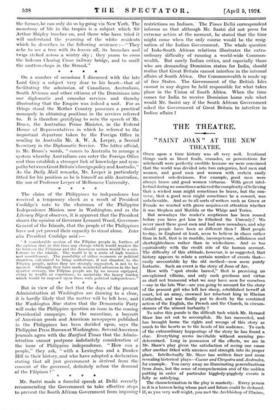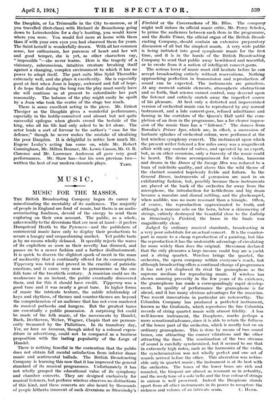THE THEATRE.
" SAINT JOAN " AT THE NEW THEATRE.
ONCE upon a time history was all very well. Irrational things such as blood feuds, crusades, or persecutions for witchcraft were perfectly credible because we were convinced that the world was divided into two categories, bad men and women, and good men and women with certain easily memorized sub-divisions. For example, good men were always brave and good women virtuous. With great intel- lectual daring we sometimes achieved the complexity of believing that a wicked man might sometimes be brave, but the con- verse, that a good man might sometimes be a coward, was unbelievable. And so to all sorts of writers such as Green or Fronde we reacted with grave acquiescent attention whether it was Stephen and Matilda or the Whigs and Tories.
But nowadays the reader's scepticism has been roused before you have got him to Ethelred the Unready.! We never meet these good men and bad men nowadays, and why should people have been so different then ? Most people to-day, in England at least, seem to believe in chaos rather than in hell, that is in muddle, incompetence, selfishness and shortsightedness rather than in wickedness. And so too equivalently with the credit side of the human account. The difficulty of this attitude, however, is as suggested, that history appears to relate a certain number of events that— easily accountable by the old method—now seem purely fantastic. Such an event is the story of Joan of Arc.
How with " spot stroke barred," that is premising no unexplained villains, and only such goodness and virtue as shall not transcend what we may have seen for ourselves —say in the late War—are you going to account for the story of the peasant girl who left her sheep, established herself at court, led an army, crowned her reluctant king in Rheims Cathedral, and was finally put to death by the combined action of the English, the French and the Church, in circum- stances of the utmost barbarity ?
To solve this puzzle is the difficult task which Mr. Bernard Shaw has set out to accomplish. He has succeeded, and has brought home the rights and wrongs of this story as much to the hearts as to the heads of his audience. To each of the extraordinary happenings of the story he has found a clue. Everything seems inevitable without seeming pre- determined. Long in possession of the effects, we are in Mr. Shaw's play given the satisfaction of seeing one cause after another fitted with niceness and strength into its proper place. Intellectually Mr. Shaw has written finer and more revealing historical plays—Caesar and Cleopatra and Androcles, for example. You carry away no illuminating generalizations from Joan, but the sense of comprehension and of the sudden putting in order of particular higgledy-piggledy events is fully as satisfying.
The characterization in the play is masterly. Every person in it is a human being whose past and future could be deduced. If, as you very well might, you met the Archbishop of Rheims, the Dauphin, or La Trdmouille in the City to-morrow, or if you travelled (first-class). with Richard de Beauchamp going down to Leicestershire for a day's hunting, you would know where. you were. You would feel more at home with them than if with your own eyes you had observed them for years. The Saint herself is wonderfully drawn. With all her common sense, her enthusiasm, her pureness of heart and her wit and good temper, she is yet, as other characters say, " impossible "—she never learns. Hers is the tragedy of a visionary, subconscious, intuitive creature breaking itself against a changing, complex environment to which it has no power to adapt itself. The part suits Miss Sybil Thorndike extremely well, and she plays it excellently. She is especially good at first when Joan is happy, awkward and full of hope. I do hope that during the long run the play must surely have she will continue as at present to subordinate her part reasonably. The balance of the play might easily be spoilt by a Joan who took the centre of the stage too much.
There is some excellent acting in the piece. Mr. Eniest Thesiger as the Dauphin gives a wonderful performance, especially in the boldly-conceived and almost but not quite successful epilogue when ghosts crowd the bedside of the king, who all his life had only asked to be let alone. The actor lends a sort of fervour to the author's " case for the defence," though he never makes the mistake of idealizing the poor Dauphin. It is delightful to notice how much Mr. Eugene Leahy's acting has come on, while Mr. Robert Cunningham, Mr. Milton Rosmer, Mr. Lewis Casson, Mr. 0. B. Clarence and Mr. Lawrence Anderson all gave very good performances. Mr. Shaw has—bar his own previous two—
written the best of our modern chronicle plays. TARN.



























































 Previous page
Previous page